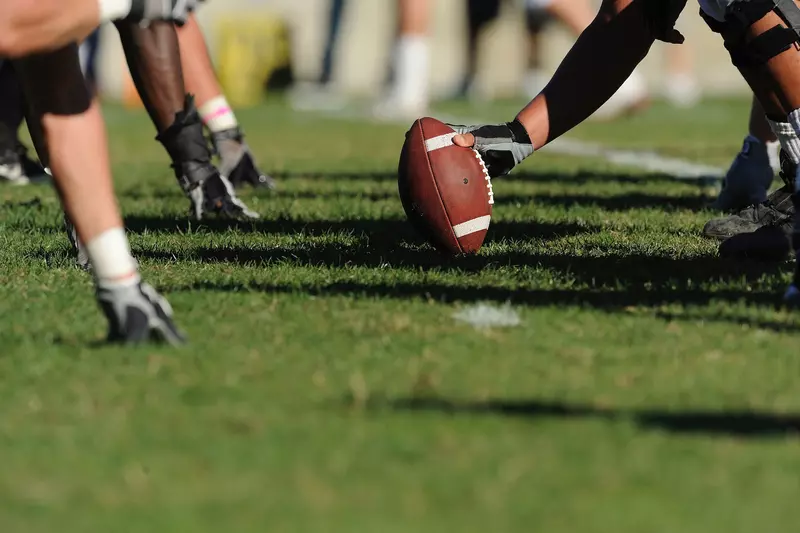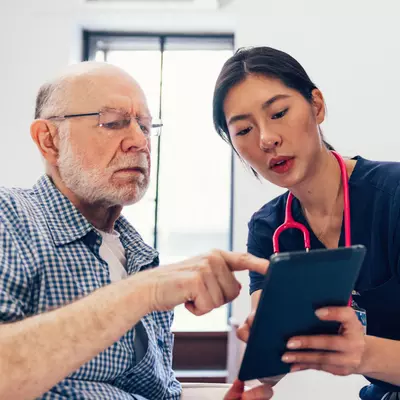- AdventHealth

AdventHealth partners with UCF football to create the ultimate sports medicine team for its athletes. And AdventHealth’s Bill Sanders (MS, ATC, LAT) has been an integral part of this partnership as a UCF Assistant Athletic Trainer with the Knight’s football program for over half a decade.
Combining the cutting-edge medical technology of AdventHealth with one of the largest universities in the country has created a powerful relationship when it comes to providing student athletes with the very best of sports medicine.
Helping student athletes perform their best also involves treating the inevitable football injuries that can strike at any time. From linemen playing defense in the trenches to receivers sprinting down the field, every player can be at risk. That’s why Sanders and the entire UCF Training Team is there to spring into action when injuries arise.
Here are some common football injuries as well as how they are managed and treated.
Muscle Injuries
The large muscle groups of the upper leg, the hamstring and quadriceps, are particularly at risk for players running long distances at full speed such as corner backs and wide receivers. The degree of injury can vary from a mild strain to a full-blown tear. The upper body is at risk as well. Lineman and linebackers can suffer tears to the pectoral muscles as they engage in blocking and tackling.
Ligament and Tendon Injuries
Sometimes the physics of football prove too much for an athlete’s body to handle. These injuries often occur without any contact with an opposing player. The repetitive torque exerted on the knees and ankles can cause ligaments and tendons to tear or rupture, causing sprains.
Broken Bones
The force of opposing players colliding during a football game can also lead to broken bones. The bones of the lower leg, the tibia and fibula are particularly vulnerable, as well as the bones of the hand. A forceful tackle can also cause broken ribs.
Treatment and Recovery
It is up to the very skilled and experienced UCF medical and athletic training staff to assess, diagnose and treat these injuries. They must make quick decisions on whether the player is able to return to the field, or they need further medical attention.
Just as AdventHealth is your trusted partner for whole health, the UCF medical, training and sports medicine staff are responsible for maintaining the whole health of their players. The doctors and athletic trainers must manage all aspects of the players’ health, making sure the team is in top shape to perform.
Sanders says, “The best tool we have is education. When an athlete suffers an orthopedic injury during a game they are evaluated by an athletic trainer and/or one of our orthopedic physicians. If they pass a battery of tests and are deemed healthy enough to go back and are comfortable going back in, then they are allowed to return. If the battery of tests is inconclusive the athlete is held out or taken for additional tests in the locker room or taken to x-ray. The number one objective is to ensure the safety of our student athletes both for the present and their future.”
Managing injuries doesn’t end when the game is over. The athletes and athletic training staff continue to work through every athlete’s training and recovery day in and day out, including offseason. The severity of the injury is the major factor in the approach the staff takes to treatment.
As Sanders explains, “Every injury is different and requires individual attention. Some of the basics that are considered when returning from injury are strength, range of motion and one’s confidence in their ability to perform. Some injuries will require a progression of non-contact practices before the athlete returns to full activity. We also have five certified athletic trainers at every practice with unchallengeable authority to remove an athlete from activity if we think it is dangerous or put them at additional risk of further injury.”
Injury Management
Managing injuries mid-week is a big part of getting the team ready for Saturday’s big game. There are many treatments that can help the athlete recover from minor injury or wear and tear.
Here are some of them.
- Compression Therapy: This prevents swelling by not allowing excess fluid to build up in the injured area. Ace bandages or athletic tape can be used to secure the body part in question.
- Cold Therapy: Cold is another way to treat inflammation and relieve pain. Applying fresh cold packs or ice in 20-minute durations can increase circulation and promote healing.
- R&R: Sometimes, rest is just what the doctor ordered. The repetitive nature of practice and game responsibilities can wear down specific parts of the body. Simply resting the injured area can allow it time to heal naturally.
When it comes to recovery, the same principles apply to both Knight fans and athletes: both must be properly diagnosed, receive the proper training or physical therapy regimen and manage the mental hurdles of moving on post injury.
Sanders puts emphasis on fully healing before athletes return, “It is important to let injuries fully heal especially when playing football at a high level because if the athlete is hesitant on the field it will impair their ability to perform in addition put them at risk for further injury.”
Post-Injury Treatment
The rehabilitation process varies for different injuries and their severity, but the approach to healing fully and quickly often involves staying in motion.
“Throughout the season most football players will experience bumps, bruises and general soreness. Some may think that if you’re sore that you should sit out and do nothing. It is actually important to get your body in motion. For the team that could mean doing some running and dynamic stretching or doing some exercises in a recovery pool. Rest is important and an emphasis the day after a game, but come Monday, they’re on the practice field running and doing dynamic stretching,” Sanders says.
This is sound advice for fans, too. Sometimes the best course of action is limited activity that can help promote blood flow and the body’s natural healing process. The appropriate anti-inflammatory or pain medications may also help facilitate this process. It’s advised to always follow your doctor’s advice when taking medication.
Recovering from an injury can take an emotional toll as well. It’s common for self-doubt and anxiety about one’s ability to return to the field or normal life to affect the mental aspect of an athlete’s performance.
That’s where Sanders can assist in helping regain trust in the body. “An understanding of anatomy is imperative to making decisions about things that one can play through and others that they should not. We do various manual/cognitive tests that ensure the athlete is safe to return. From there we educate the athlete on what is happening with their bodies. During every game we have orthopedic and general medical physicians on the field that are all trained in sports medicine that also partake in the evaluation process. They too are a valuable resource in educating our student athletes on the level of risk associated with what is happening.”
Win With Whole Health Care
Football, like life, can result in some unwanted bumps and bruises. But whether you’re a UCF Knight battling on the gridiron, or a fan rooting them on, injuries can happen. The important thing is receiving the proper care and following the advice from trusted AdventHealth practitioners like Bill Sanders. With a little time and the proper rehabilitation, you’ll be back in the game in no time.
Learn more about the AdventHealth and UCF Knights partnership.


